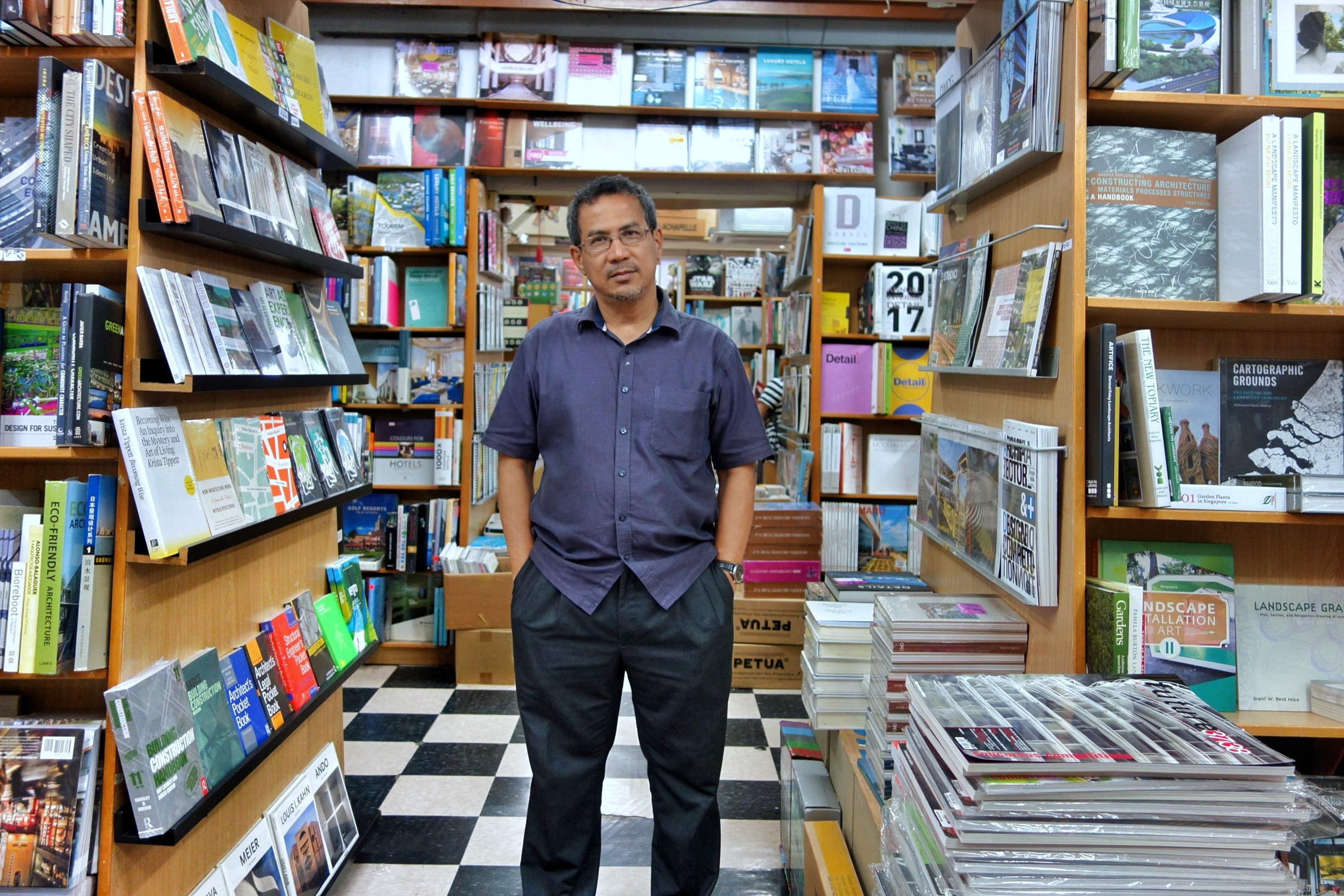
Basheer Graphic Books is an iconic shop in Singapore that is known for its design-related books, run by Abdul Nasser whom you can often see at the store.
The shop has a rich history dating back to the 1980s when Abdul Nasser’s father would personally go from office to office with travelling luggages filled with carefully curated books. Each visit was a delight to the creatives in the pre-internet era! The books covered various disciplines including art, interior design, architecture, typography, and photography.
In a world dominated by e-commerce, Basheer Graphics continues to push through. In this interview, discover the remarkable journey and invaluable insights from the owner, Abdul Nasser.
Browse the interview!
- How did you start this business?
- Describe a day in a life as a bookseller.
- Are you a big reader?
- What does this bookshop mean to you?
- How do you choose your books? And how do you keep up with design interests?
- People can easily go online for design references. How are you approaching this shift in customer behaviour?
- What do you do about books that do not sell?
- Do you have any books that’s been around since you opened 30 years ago?
- What have you noticed about book trends?
- What are image-based books?
- How are books turning into art pieces?
- So, do you regret selling the books earlier?
- What gives your bookshop its edge?
- Why do people care about independent magazines?
- What are some of the high-selling independent magazines?
- Who are your customers?
- I’ve noticed many tourists at your shop.
- Who is managing your social media accounts?
- Does social media bring you new customers?
- How did you get so many Facebook followers?
- What kinds of inquiries do you get from customers?
- They say a bookshop is only as good as its bookseller. What do you think?
- Do you know most of your customers?
- It sounds like your role as “A Bookseller” travels with you!
- How do you deal with competition from bigger bookstores?
- What is your biggest challenge running this business?
- What are you doing to survive this digital transformation?
- What did you learn from closing down your bookstores in Hong Kong, Jakarta, and Bangkok?
- What have you done to counter this downward trend?
- How do you keep margins healthy?
- What costs do you cut to stay afloat?
- How do you decide which books to buy from the distributor, and which ones to consign?
- Any advice for aspiring booksellers?
- What are some surprising things that you have experienced as a bookseller?
- People talk about how bookshops are a “force for good” in the community. What do you think?
How did you start this business?
While I was interviewing Abdul Nasser, one of his long-time customers, Dawn Liang, happened to pop into the bookshop with her daughter. Dawn shared some of her earliest memories of Basheer Graphic Books: “He used to come regularly to my office with his father, both of them carrying two big luggages full of books! We didn’t have Internet back then, so we really looked forward to their visit. We would all crowd around and be fascinated by the design books they brought for us! It made our day whenever they visited! They were so strong, and so hard-working.”
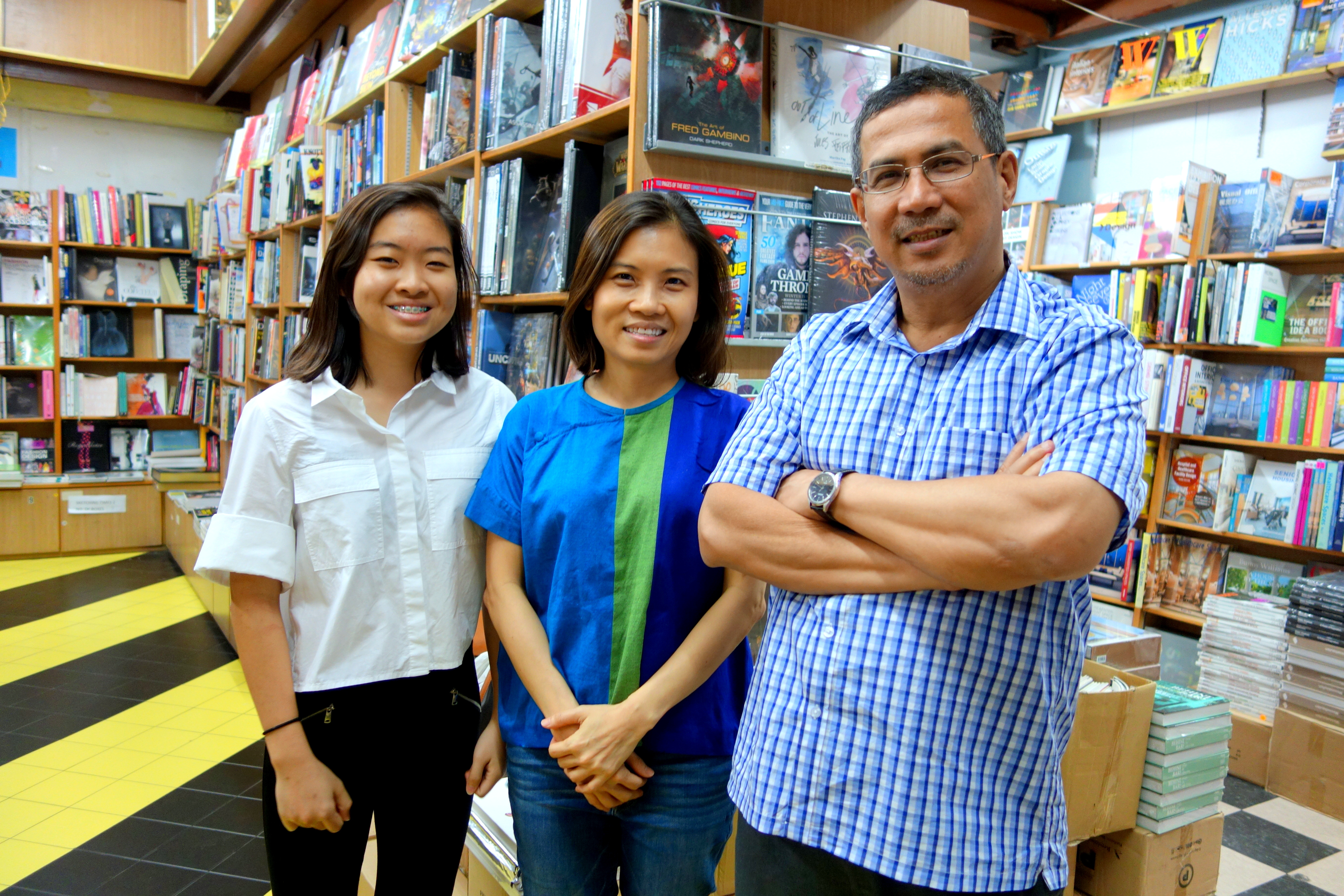
Abdul Nasser: This shop has been around for 24 years, but we have been selling books for over 30 years. Now my father has returned to India. Even my grandfather was selling books and stationery. We used to go to offices door-to-door with our books and, today, we still go to some of our clients’ offices. Dawn was one of my customers from those days, and now she still comes back with her daughter!
Describe a day in a life as a bookseller.
I come here, open the mail… you know, the day-to-day is just like any other business. I need to answer the suppliers, pay their bills, and request orders. Nowadays, we also look into our social media sites like Facebook to see if there are any inquiries, and answer Instagram comments. We check what books are sold out, and follow-up.
Are you a big reader?
I’m not a big reader, honestly. But, at the end of the day, over the years, I have the knowledge of design and architecture.
What does this bookshop mean to you?
At the end of the day, this is my rice bowl. There is no choice. I need to keep going on. I’m already 52. If I change trades, I don’t know what other thing I will do. We have been doing this for over 30 years… We just need to find a way to sustain it.
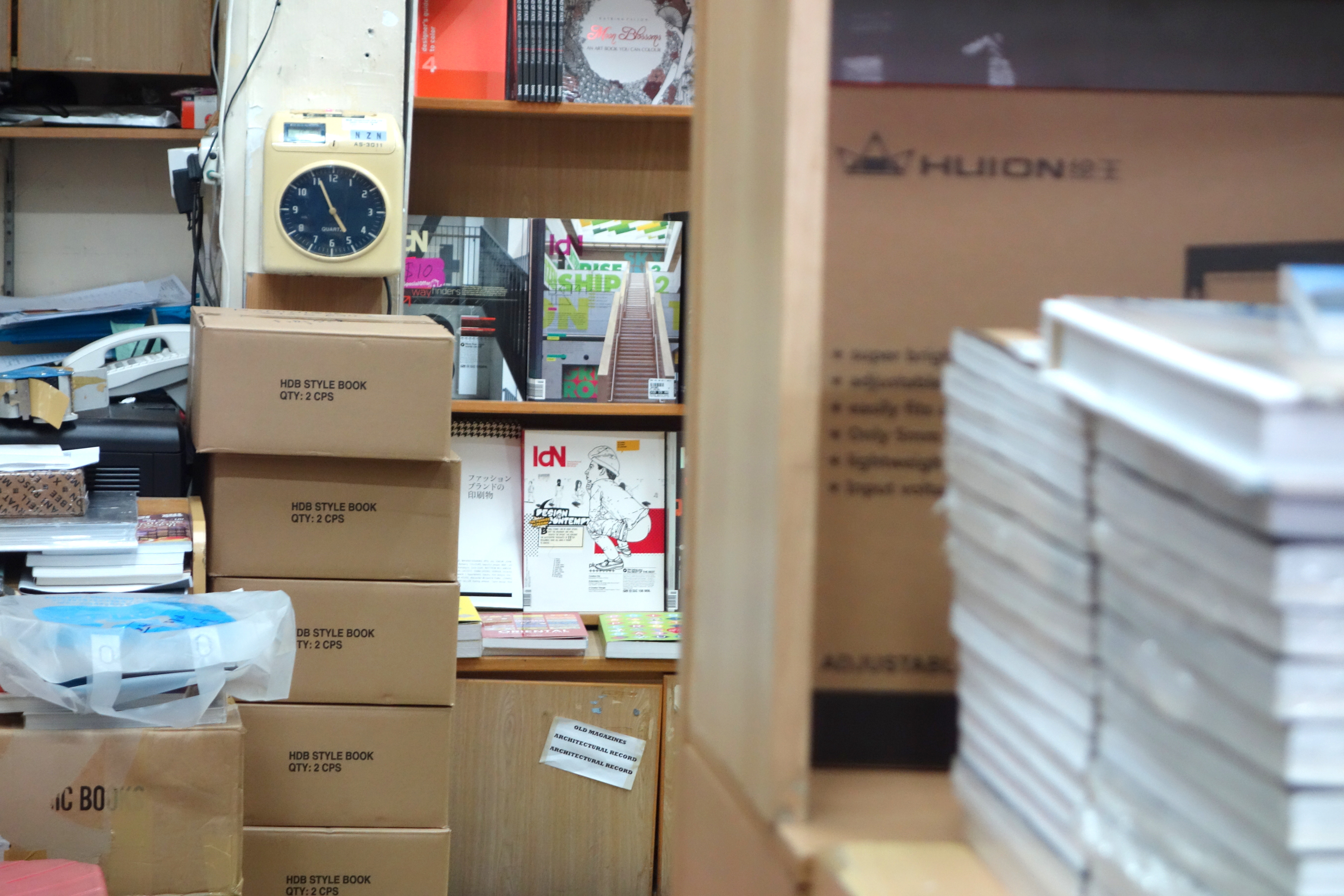
How do you choose your books? And how do you keep up with design interests?
We find out from our customers, social media, and crowd-funding platforms like Kickstarter where we find things that are not available in the mainstream or online. We just need proper logistics to bring the books to Singapore from the UK, US, and other countries. Whenever I travel overseas, I visit independent bookshops. So I know what is selling, what people like, and what we are lacking. It’s like finding the right bricks to build the company, one by one. And of course, with the digital revolution, I browse books online. I have probably visited most of the design and architecture bookshops in any country.
People can easily go online for design references. How are you approaching this shift in customer behaviour?
We try to keep a different inventory from online shops. Our product mix must be different than others, so that when people come into this shop, they say: “Oh, I never see these things online!” or “I have never seen this in my life!” This is what makes this place more unique than others. We always want to find ways to be more unique than others. If you just want people to buy books, they can go online and find it.
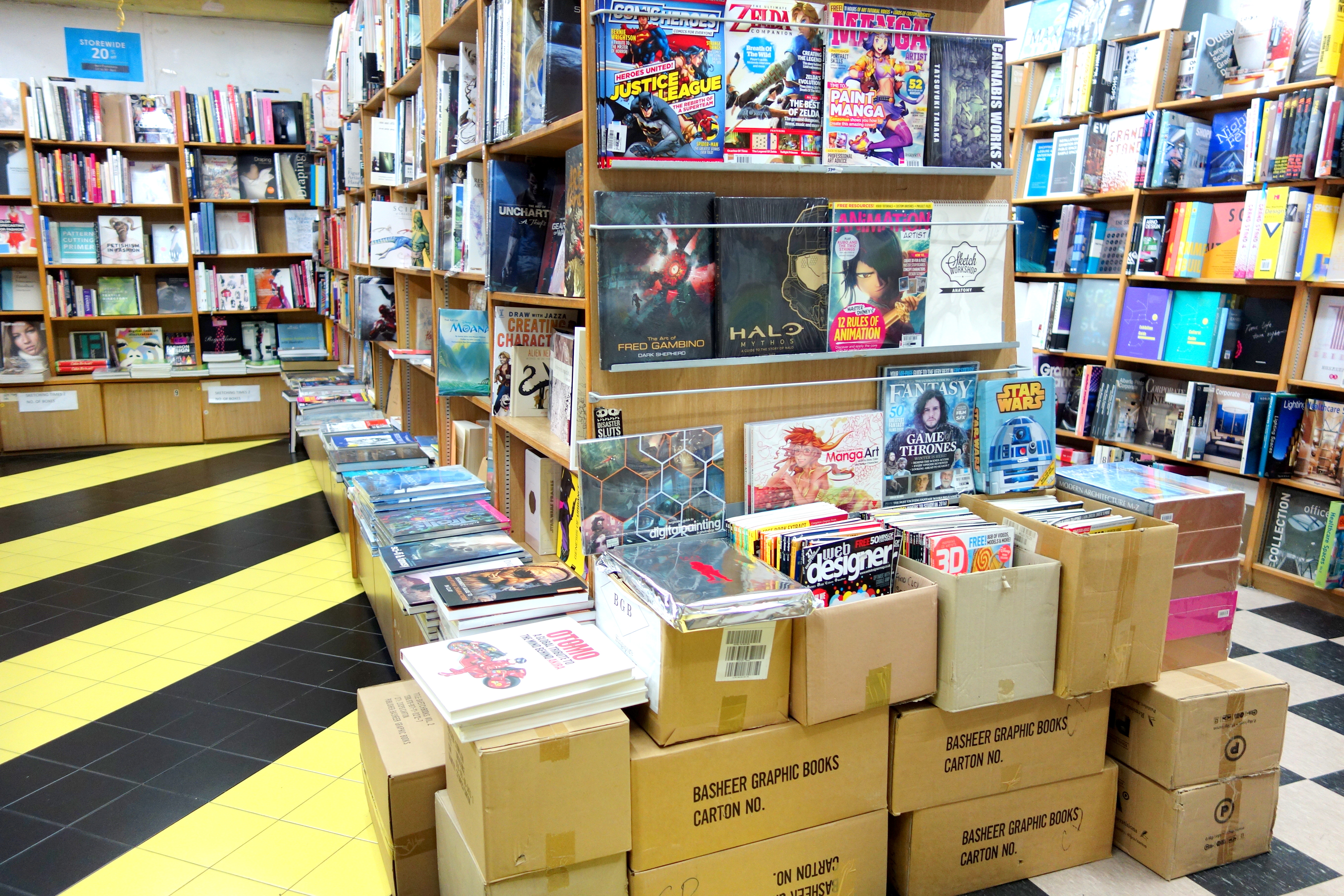
What do you do about books that do not sell?
This is a good question… We might use promotions, and just try to sell them. I have seen books that sell after lying in my shop for more than ten years! Some of the books become more valuable after time. We never throw away our unsold books!
Do you have any books that’s been around since you opened 30 years ago?
[Laughs] Maybe! There is a possibility… I’ll have to check.
What have you noticed about book trends?
In the beginning, we sold a lot of image-based books. People depended on us to find books for their references and projects. Now, there are a trillion or more of these images online!
What are image-based books?
Hotel designs, restaurant designs, packaging, brochure designs. Last time, every single day, people would call to ask if we had stock, and ask us to bring our books to their office. Books about new bistros, new offices interiors, new restaurants. Now, it seems that the book trends are social media driven. People buy them to give as a gift. Books are no more a necessity; now it is a novelty. And good books are even becoming an art piece.
How are books turning into art pieces?
Last time, books were a necessity— there was no other choice. Now, people are collecting them like art. If the publisher only printed 3,000 copies and the book is keeping nicely, in many years, there will be a lot of value in the book, especially my kind of books—the art books and photo books. Already, I can see it. Books sold seven to eight books ago for $30 or $40 can now sell for $100 or a couple of hundred very easily because it is out of print, or even $500.
So, do you regret selling the books earlier?
[laughs] No, no!
What gives your bookshop its edge?
We are one of the few specialized bookstores remaining that sell a lot of independent magazines. We have more independent magazines than anyone in the whole town— even in the region, if you don’t consider Japan or Taiwan. So we meet a lot of different customers with unique interests.
Why do people care about independent magazines?
With digital media, you can find and reproduce a lot of things online, so the mainstream is boring. People want an alternative, so they look for independent magazines. Independent magazines are not dictated by big publishing arms, so there is a lot of freedom. They are not money-driven like the common magazines.
What are some of the high-selling independent magazines?
Quite a few, such as Cereal and Kinfolk.
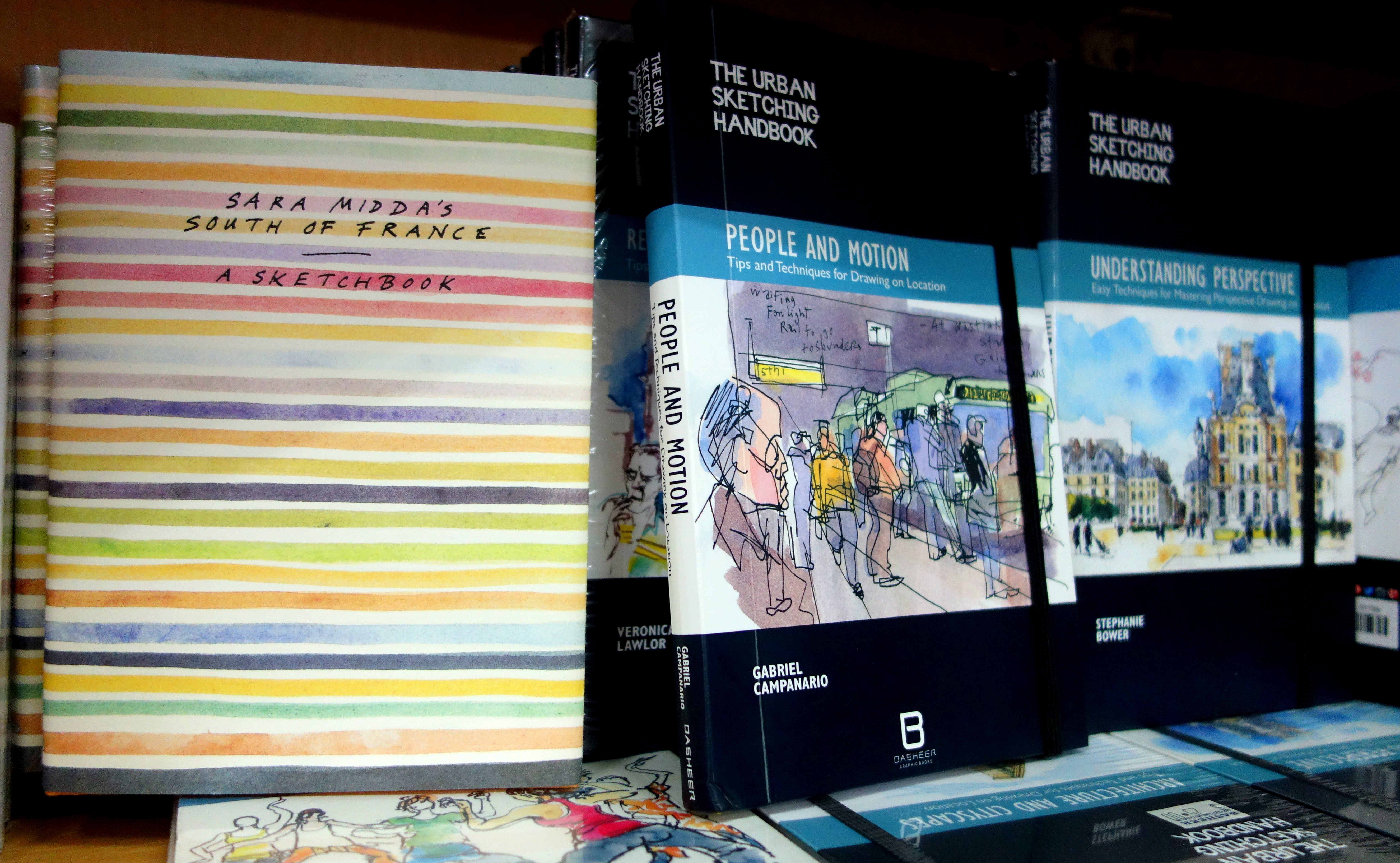
Who are your customers?
We always thought designers buy designer books, but we are surprised to see a lot of people who are studying medicine, or mathematics, or totally unrelated fields. They consider design a hobby; a source of relaxation. They say: “My work makes me really stressed, so I want to read something that gives me a different angle.”
I’ve noticed many tourists at your shop.
Our customers come from around the world: Vietnam, the Philippines, Norway. They are so surprised when they enter my bookshop! They exclaim: “All the other shopping centres in Singapore are so boring; they all have the same kinds of things!” They are shocked to discover an independent bookshop. They say: “Wow, this shop is so different, we don’t have bookshops like this where we live. We need something like this in our town!” The only thing is that foreigners cannot carry a lot of things in their bags…
Who is managing your social media accounts?
I do it… it’s pretty simple! It only takes a few minutes each time to upload the photos and the caption. I also take the photos of our books, or we find photos online that we share.
Does social media bring you new customers?
All the new-age kids are on their phone, so we are finding a lot of customers there. Nowadays, people spend a lot of time online, so we need to interact with them wherever they are. They aren’t visiting us personally to find what they need, as much as they did in the past. Our Facebook has more than 65,000 fans. At the end of the day, we have found that social media is one of the winning games for sustaining the business.
How did you get so many Facebook followers?
It was easier when Facebook started five to six years ago. Nowadays, it is getting tougher to increase our count but, over the years, we have gotten to know what posts people like; the trend of what people like. We also get help from a local popular blogger (Parka Blogs) who reviews books and posts the images. He mentions my name, so some of the customers come from there.
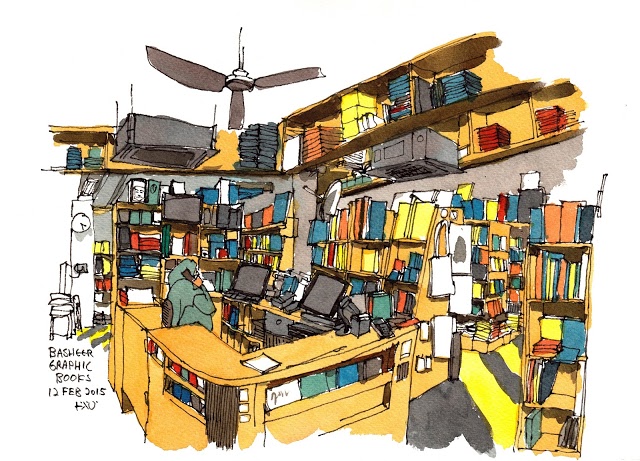
What kinds of inquiries do you get from customers?
Every month, we get at least 20 to 30 emails asking about out-of-print books. People always think we may have it, and they know the value of the book. I may have a few copies, but once it’s gone, it’s gone. A few months back, I received two or three emails from New York to ask about a book called Typographic Purpose: Volume I. They asked: do you have stock; what’s the price? I was puzzled because this book had been sleeping in my shop for four to five years, not getting sold. It turned out that one of my customers brought a friend who manages a typography institute. He bought the book from my shop, posted it on Instagram, and it went viral.
Unfortunately, I only had three copies.
Another thing that surprised me was when we brought in a book that was published in the UK. When we put it on social media, someone from the UK asked us whether we could ship the book to him. I said: Sorry, this book is actually available in the UK, so you should get it directly from their website. Shipping from Singapore will be quite expensive. It’s funny how social media makes it possible for people outside Singapore to discover books in our bookshop before they find it in their own country.
They say a bookshop is only as good as its bookseller. What do you think?
We love to talk to our customers. We ask what they are doing, what kinds of books they are reading, what is their favourite journal, who is their favourite designer. Over the years, we have grown up together with some of the architects. It’s a circle. Last time, the architect was a student, looking for references for their projects. They then go to the workforce and get their first job, and they are still learning skills. Then they become a senior designer. Later, maybe they become a boss. We really see them grow up in their field. Some of them started as a small firm with two or three people, and now they became giant firms. A few of them even return with their children!
Do you know most of your customers?
Not all, because not everyone is a regular. But, once, when I was on the train in London, two people bumped into me, and they were my customers! We chit-chatted, and they asked me enthusiastically: “Hey, where can we get good books in London? Where are the cheap books?”
It sounds like your role as “A Bookseller” travels with you!
It really surprises me! One day, I was at the airport when some people came up to me and asked: “Hey, are you from Basheer Graphics Books? I really like getting books from you!” People are able to recognize me! Honestly, I am so surprised— I’m shocked! A lot of people seem to know me indirectly. I think that if I was in another business, people would not know me, even if I was successful. But, in the book business, because I am running a bookshop, people seem to recognize me.
How do you deal with competition from bigger bookstores?
We are niche to the design community. We sell design books, architecture books, gaming books, animation books, and photography books. Our only competitor is the online bookshop.
What is your biggest challenge running this business?
Technology is the biggest challenge because technology has replaced a lot of things, you know? Changes happen very quickly. I know more changes are coming. We can’t complain because it isn’t as quick as it could be. If people had told us there would be no Nokia phone, no Kodak – who would have believed it? These gigantic icons have disappeared. In the book business, it’s the same thing. Borders has gone in Singapore. We are among the last few survivors. The good days are gone, but we can still sustain.
What are you doing to survive this digital transformation?
We need to run the extra mile. Last time, my shop used to be like a supermarket. We sold a fixed collection of book titles every day, and it went quite well. Nowadays, my role is like a specialized doctor. I need to diagnose each customer, understand their tastes, look at what they are buying, and what they are seeking. We need to interact more with the customer to understand each customer’s needs. Only then can we sustain the business. Moving forward, we cannot depend on what we are doing now. We need to do more social media marketing. We need to create more experiences, like host more interactions with the designers here. We have a lot of ideas: the only thing is how we are going to implement it. It comes down to dollars and cents, but we definitely need to do something different.
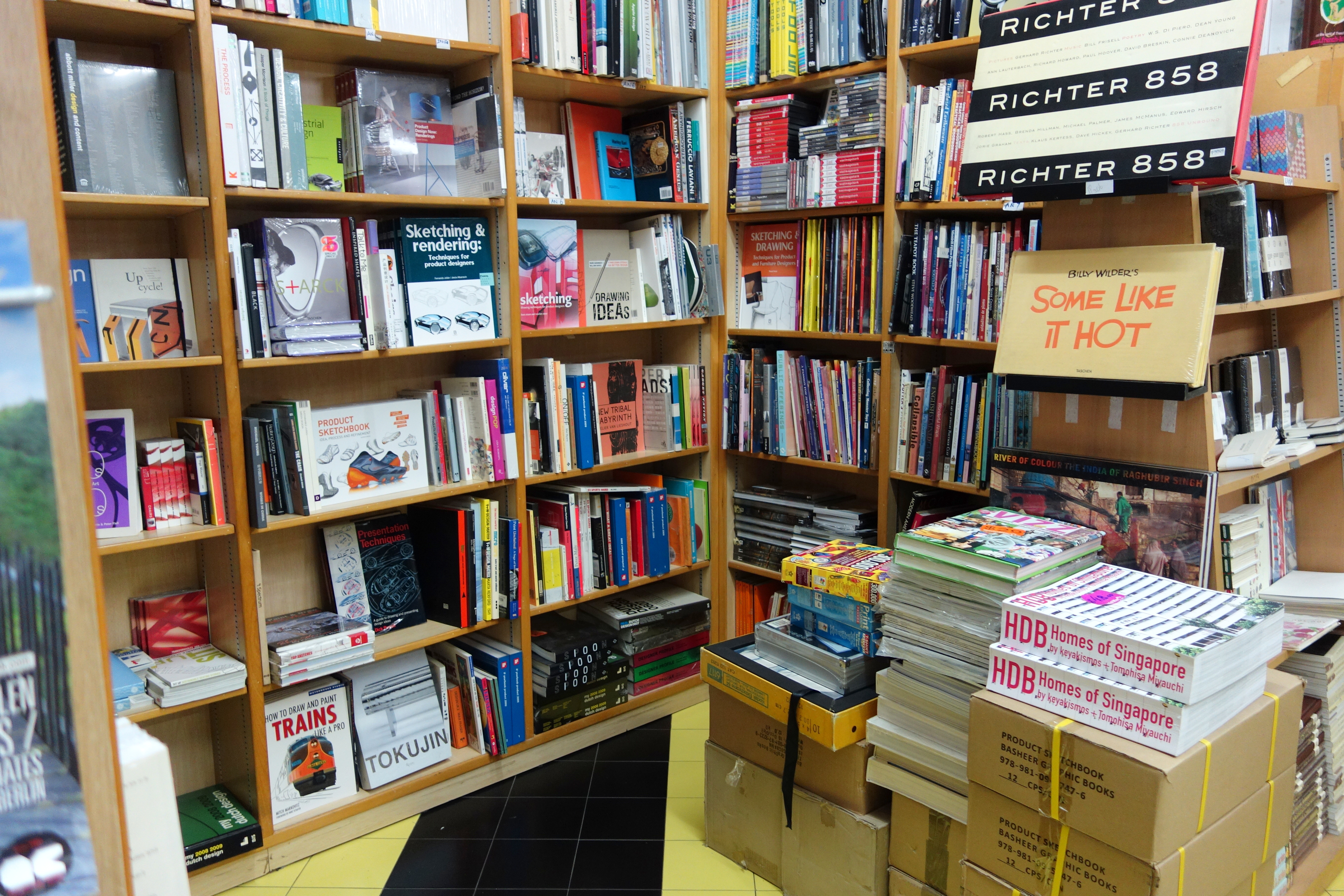
What did you learn from closing down your bookstores in Hong Kong, Jakarta, and Bangkok?
The book business has changed. I opened up my stores in the pre-Amazon days, during the pre-digital revolution. Sales were hard to maintain after that. Sales in this shop have dropped 40% from the good days. In the last few years, this decline has stopped, and we are still trying to recover. We have two shops left: Singapore and Kuala Lumpur.
What have you done to counter this downward trend?
I can’t do much. The online thing is dictating everything.
How do you keep margins healthy?
Our sales are down and, on top of that, our margins are also down (because we need to match the prices online), and our inventory is not moving as fast. We need to cut our costs to sustain. We are waiting for print to return… we can already see that digital sales are dropping. We just keep going forward. At the end of the day, we listen to our customers. They give us feedback and suggestions for new titles and new books.
What costs do you cut to stay afloat?
The most challenging now is my inventory. Last time, I could sell my inventory in two or three months; now, it takes five to six months. But, I still need to pay my supplier within three to four months. Some suppliers give me credit, but if the books do not sell, I still need to pay them. Some books are consigned, but I also buy some of this stock.
How do you decide which books to buy from the distributor, and which ones to consign?
If I am confident that there is a 50-50 chance of selling it, I will buy it. A lot of this depends on what my customers want.
Any advice for aspiring booksellers?
If they are a new starter, they should not only run as a bookshop. They need to do something together with the bookshop. If all you have is the bookshop, it will be difficult to sustain it. They can do something in the back-end. The bookshop will bring them something, but the backend will sustain it. A lot of smaller bookshops are doing this in other countries. They aren’t only running a bookshop—they’re doing other things, too. An old bookshop in Paris is selling a lot of fashion books, but behind the bookshop, he hosts fashion runways, photo exhibitions, and photoshoots – to make money.
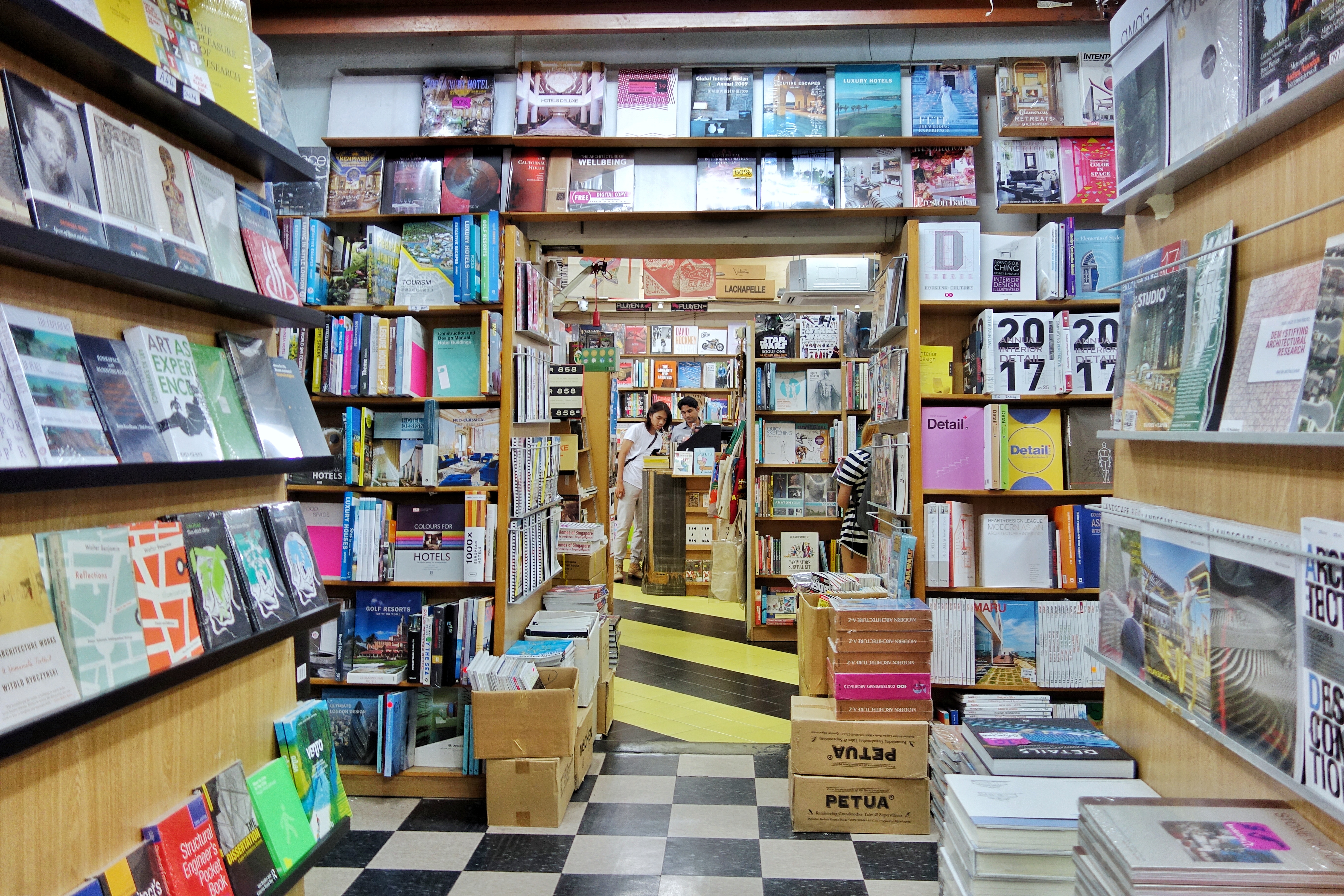
What are some surprising things that you have experienced as a bookseller?
A lot of people come back to shoot their wedding photos. Why their wedding photos? Because the bride and groom used to come to my bookshop, and they grew up with my bookshop. Even though I’m not a 5-star hotel, or a big garden, they see some memorable value in my space. The shop has some meaning for them. It really pleases me to see this!
People talk about how bookshops are a “force for good” in the community. What do you think?
Nowadays, globally, the bookshop is becoming a social gathering space. I see students come together in groups after school in their uniforms. When they want to meet, they will say: go to Basheer, I’ll drop by and meet you later. It’s better than meeting at Raffles City (the train station) where they just stare at their handphones while waiting. If they come to a bookshop, they can look at the books, browse things—have a feeling, you know? So the community comes together. Even big bookshops in big towns are like meeting places, and after that, they will move to a cinema or go to a party.
Curious to delve into Basheer Graphic Books? Behold their trove of books!
- Basheer Graphic Books website
- Facebook @BasheerGraphic
Shopkeeper Stories is a photographic documentary of small business owners with their trades around the world, sharing their insights and stories. Follow the journey on LinkedIn, Facebook and Instagram @ShopkeeperStories. See you there!
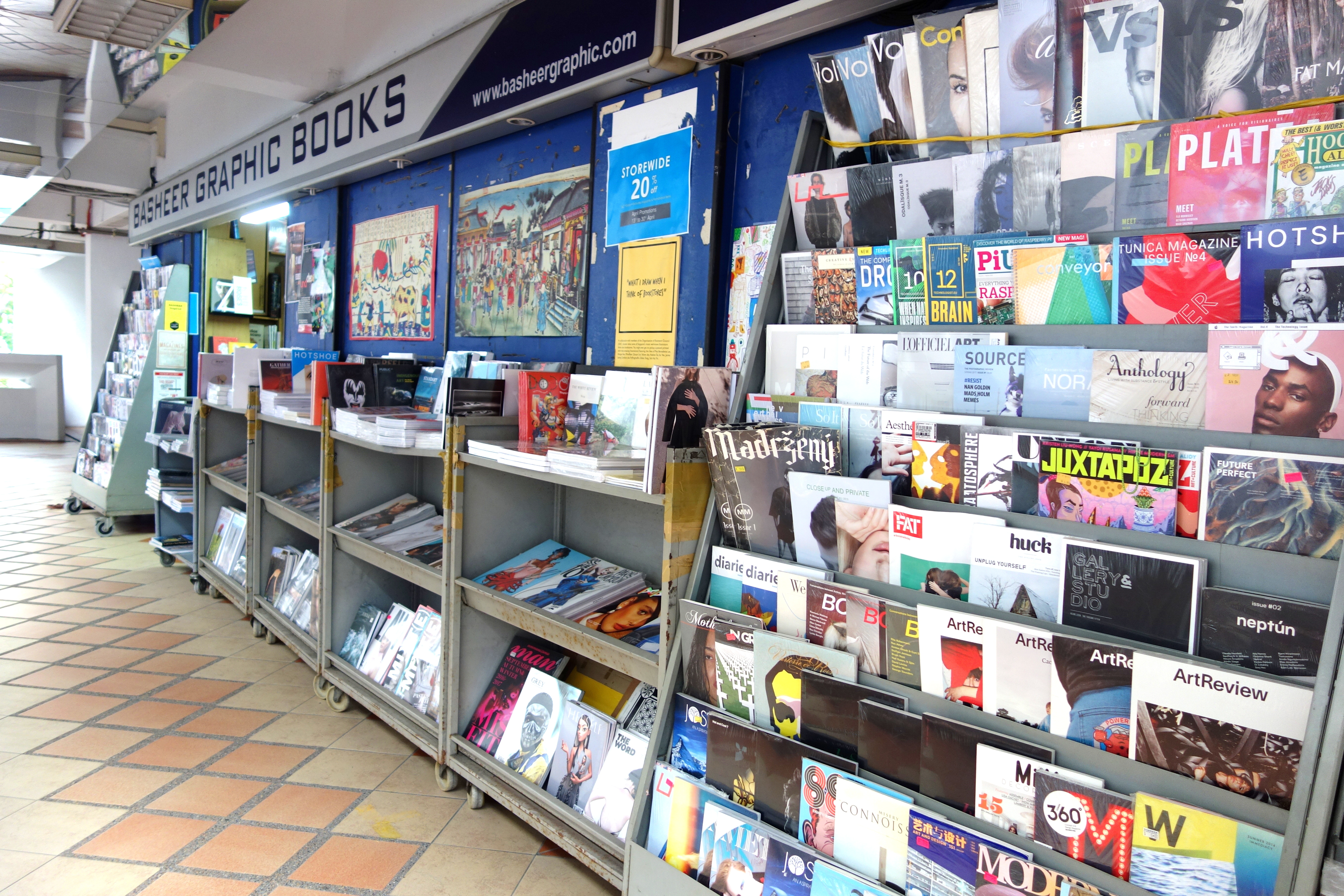
Loved this. Sounds like a truly charming independent book shop.
I’ve given you a follow to keep up with the rest of your Shopkeeper stories. I also write a blog of my own, based largely on travel, so feel free to take a look!
Cheers 🙂
LikeLiked by 1 person